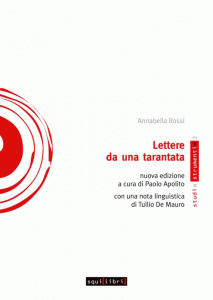 Let’s talk about Annabella Rossi – after the news a few weeks ago on the archive photo of the museum of history and folk traditions of Rome – because the publisher Squilibri has published a new edition of one of the most famous books of her anthropological production. It is “Letters from a tarantata”, a collection of letters testifying the relationship occurred between Rossi and Anna, a “peasant, born in 1898 in a village in the province of Lecce,” met for the first time in Galatina in 1959, on the occasion of the research that De Martino was conducting on the tarantism of Puglia. As we know Annabella Rossi participated – as a member of a team made up of specialists from various disciplines – to that fundamental research for anthropology Italian and beyond. The consequences of this complex and unexpected world continued to reverberate even after the conclusion of the work on the lives and careers of the scholars involved in that experience. The Rossi proposes an unusual version – which opens a space for reflection “thoughtful” through written and unmediated representation of a report and an articulated “subordinate”, “present” relational sphere – that focuses on the “local” story, perception, interpretation of the social and political dynamics that have framed the phenomenon of tarantism. Letters, whose first edition was published in 1970, “gave body to the intentionality of a protagonist of the magic world of the South” and above left “emerge a voice, ‘unpleasant’ to ears accustomed to other expressive registers, in only be heard denouncing the limits of ideological mechanisms by which members of the lower classes were too often confined in a state of exclusion, even before that of subordination, turning potential pulses in a silent protest resignation”. This new edition – which follows the first reprint edited by Paolo Apolito in the mid-nineties, which also introduces this edition with an essay full of suggestions – takes on new meaning in light of the political-cultural contemporary, framed in an analysis including dialogic anthropology and “outcomes revivalistic of so much interest in popular culture”.
Let’s talk about Annabella Rossi – after the news a few weeks ago on the archive photo of the museum of history and folk traditions of Rome – because the publisher Squilibri has published a new edition of one of the most famous books of her anthropological production. It is “Letters from a tarantata”, a collection of letters testifying the relationship occurred between Rossi and Anna, a “peasant, born in 1898 in a village in the province of Lecce,” met for the first time in Galatina in 1959, on the occasion of the research that De Martino was conducting on the tarantism of Puglia. As we know Annabella Rossi participated – as a member of a team made up of specialists from various disciplines – to that fundamental research for anthropology Italian and beyond. The consequences of this complex and unexpected world continued to reverberate even after the conclusion of the work on the lives and careers of the scholars involved in that experience. The Rossi proposes an unusual version – which opens a space for reflection “thoughtful” through written and unmediated representation of a report and an articulated “subordinate”, “present” relational sphere – that focuses on the “local” story, perception, interpretation of the social and political dynamics that have framed the phenomenon of tarantism. Letters, whose first edition was published in 1970, “gave body to the intentionality of a protagonist of the magic world of the South” and above left “emerge a voice, ‘unpleasant’ to ears accustomed to other expressive registers, in only be heard denouncing the limits of ideological mechanisms by which members of the lower classes were too often confined in a state of exclusion, even before that of subordination, turning potential pulses in a silent protest resignation”. This new edition – which follows the first reprint edited by Paolo Apolito in the mid-nineties, which also introduces this edition with an essay full of suggestions – takes on new meaning in light of the political-cultural contemporary, framed in an analysis including dialogic anthropology and “outcomes revivalistic of so much interest in popular culture”.
Questo post è disponibile anche in: Italian

 English
English Italiano
Italiano 





Leave a comment
You must be logged in to post a comment.